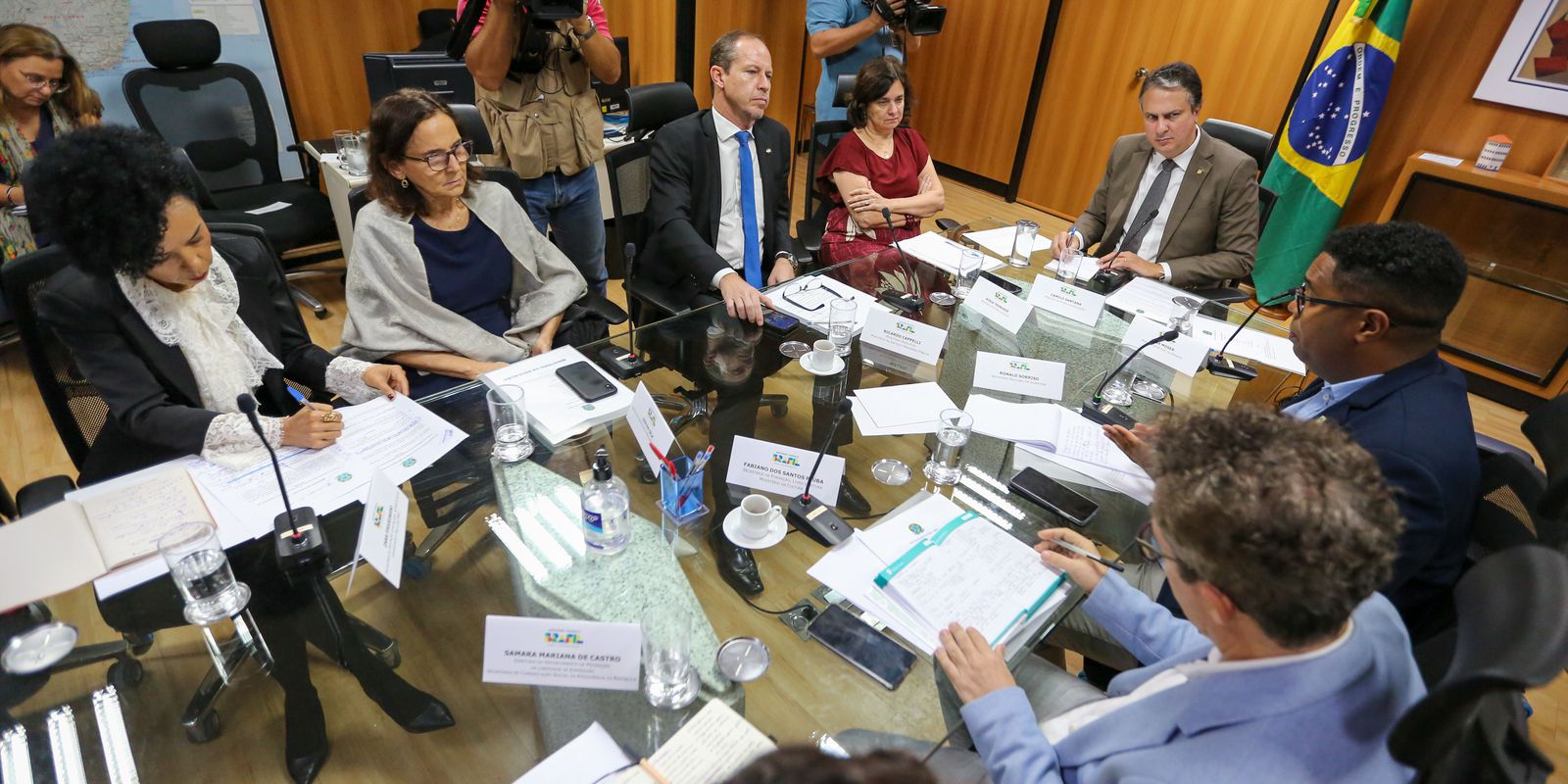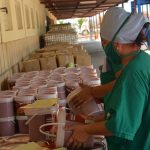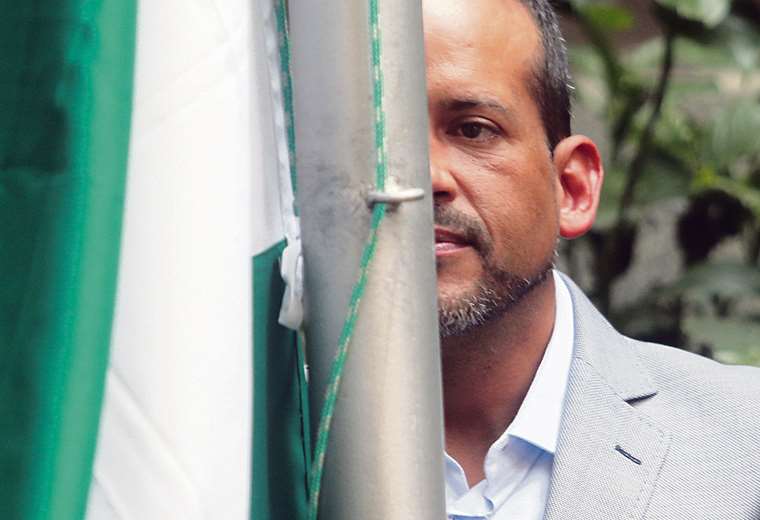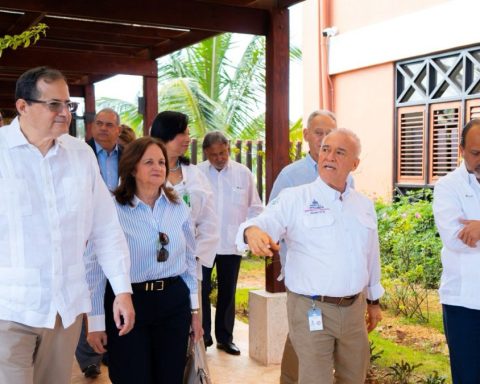The first meeting of the interministerial working group created to propose public policies for preventing and confronting violence in schools was held this Thursday morning (6), at the headquarters of the Ministry of Education (MEC).
The meeting took place the day after the attack on Cantinho Bom Pastor private day care centerin Blumenau (SC), in which four children died.
After the group’s meeting, in Brasília, the ministers announced, in a press conference, that immediate actions were discussed and others to be adopted in the medium and long terms to combat the problem.
first proposals
According to the Minister of Education, Camilo Santana, who coordinates the working group, the first proposal is the creation of a hotline – a direct and specific telephone channel for reports of suspected cases of attacks on educational institutions. “It is important for people to anticipate, if they notice a suspicious episode in relation to a classmate, to someone on the street, in the neighborhood. So, we want to see the feasibility of creating this channel for denouncing violence in schools as quickly as possible and having this channel more agile”, highlighted Camilo Santana.
The proposal is for the new service to work along the lines of two federal government call centers: Disque 100, coordinated by the Ministry of Human Rights and Citizenship, and Ligue 180, coordinated by the Ministry of Women.
The federal government will also draw up an emergency protocol to guide public and private schools and education professionals on how to act in case of new attacks.
The Minister of Education said that, on another front, the Ministry of Human Rights and Citizenship, which had already been doing work to combat hatred, intolerance and the radicalization of groups, should now anticipate the report that deals specifically with this issue. issue experienced in the school environment.
Through MEC, the federal government still intends to allocate financial resources to the Direct Money at School Program (PDDE), managed by the National Education Development Fund (FNDE) to transfer resources to mediate conflicts within school units.
“We are going to transfer resources to schools so that they build actions and circles of culture of peace with students. We can train and qualify our directors and teachers”, said the minister.
The Minister of Education is going to order a national mapping of violence in schools. Another action that should be launched soon by President Luiz Inácio Lula da Silva is the expansion of full-time education for children and young people.
In the field of health, the Minister of Health, Nísia Trindade, pointed out that the 2003 Health at School Program should be reinforced to improve psychosocial care within the school environment, with prevention and attention to the mental health of students and education professionals. . “We want to strengthen it in a comprehensive vision of promotion, prevention [à violência] and work with a focus on youth,” said the minister, recalling that violence has been considered a public health problem since the 1980s.
In the area of culture, public notices must be launched to promote a culture of peace within schools. Another proposal presented was the launching of a clarification campaign, still without a defined date. “The Ministry of Social Communication [da Presidência da República] will discuss the format of the campaign because it involves issues of social networks”, explained Camilo Santana.
The National Youth Secretariat, of the General Secretariat of the Presidency of the Republic, intends to carry out caravans for peace throughout the national territory to welcome young people, in partnership with student organizations.
At the Ministry of Justice and Public Security, intelligence work on social networks, focusing on calls deep It is dark webshould monitor discussions about planning new criminal attacks.
The Minister of the General Secretariat of the Presidency, Márcio Macêdo, invited the press to join the pact in order not to give visibility to murderers who attack schools so that they are not worshiped as celebrities on social networks.
“It is important for the press to help with protocols, as they have in other countries, when this type of situation happens. May this citizen not serve as an example of a hero to other people on the internet. We know that there are groups of people who feed on this type of situation. So you [da imprensa] they can also help by not giving visibility to that citizen so as not to influence other people to commit this type of atrocity.”
Next steps
The inter-ministerial working group was created by presidential decree (nº 11,469), published in an extra edition of the Official Diary of the Unionthis Wednesday (5).
According to the document, the final report on the work of the interministerial group must be presented within 180 days after the first meeting. But the deadline can be extended. Minister Camilo Santana anticipated that a first report with proposals will be released to the public in 90 days.
The ministers of Education, Camilo Santana; Health, Nísia Trindade; from Sport, Ana Moser; on Human Rights and Citizenship, Silvio Almeida (this one via videoconference); in addition to representatives of the Ministries of Justice; of culture; the General Secretariat, National Youth Secretariat; Social Communication Secretariat; and the Special Secretariat for Coordination and Monitoring of the Presidency of the Republic.
At this Thursday’s meeting, the teams from the group’s ministries that will participate in the sectoral meetings, starting next week, were defined.
According to the established work calendar, once a month, the ministers will meet to learn about ongoing discussions.
In the next meetings, the group will open space for representatives of higher education institutions and also wants to listen to civil society organizations, experts, representatives of municipal and state governments that contribute to discussing the eradication of hatred and intolerance in educational institutions.
For Minister Márcio Macêdo, everyone’s involvement is essential for effective joint actions. “We, from the federal government, state and municipal governments, civil society. It is also important to emphasize that private educational institutions also need to fulfill their role. As well as the National Congress, which needs to address the issue with legislation.”
Solidarity with Blumenau
The Minister of the General Secretariat told the press that President Lula is dismayed by the deaths of four children, which occurred on Wednesday, in a private day care center, in Blumenau. According to him, the president is personally monitoring the situation. “We want to express all our solidarity with the families who lost their children, their friends, with the inhabitants of Blumenau who lived through this tragedy. For our part, count on our solidarity and our time so that this does not happen again, that the pain of these families is eased.”
The ministers said that there is no forecast of visits by members of the federal government to the city in Santa Catarina, at this time. “The federal government is available and respects the situation of families [das vítimas]. For our part, we will take the measures that are under the jurisdiction and mission of the federal government”, reinforced Minister Márcio Macêdo.
Minister Camilo Santana stated that he was in direct contact with local authorities. “I called the governor of Santa Catarina, I was next to the mayor of Blumenau and I made available not only the Ministry of Education, but the federal government for the necessary support in this episode.”
The tragedy was also treated as a priority by the Minister of Health, Nísia Trindade. “We got in touch with the coordination of Mental Health in Blumenau and also with the Secretary of Health of the State of Santa Catarina and we will put this agenda in the meeting of the National Health Council, next week”, she informed. “The federal government]wants to contribute to welcoming the victims’ families, the school community and the entire population of the city of Blumenau,” said the minister.
On the same day as the massacre in Blumenau, the Ministry of Justice and Public Security announced the release of R$ 150 million to expand school patrols across the country, amid the wave of attacks on public and private schools and day care centers.
preventive detention
The author of the attack on the day care center in Blumenau, who turned himself in to the local police, had his arrest in flagrante delicto converted into a preventive one this Thursday afternoon. In the decision, the judge on duty considered that the conversion is justified by the “need to maintain public order and the correct application of criminal law”. The magistrate also recorded that “Blumenau, Santa Catarina and Brazil are in mourning”.
At the custody hearing, there was no questioning of the facts, nor were other parties heard. The prisoner was present, as well as the Public Prosecutor’s Office and the defendant’s defense, represented by the Public Defender’s Office.
The Court of Justice of Santa Catarina reported that the process will be processed in the 2nd Criminal Court of the district of Blumenau, under secrecy, as it involves minors under 18 years of age.


















